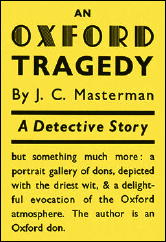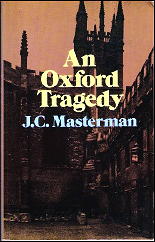Fri 15 Mar 2013
A Review by Maryell Cleary: J. C. MASTERMAN – An Oxford Tragedy.
Posted by Steve under Authors , Reviews[4] Comments

J. C. MASTERMAN – An Oxford Tragedy. Victor Gollancz, UK, hardcover, 1933; Penguin, UK, paperback, 1954. Dover Press, US, softcover, 1981.
Mysteries set in Oxford have a cultured, leisurely way with them, The protagonists are generally dons; the conversation in the Senior Common Room is on matters of scholarly import, over coffee, port, and good cigars. One feels the ease and contentment of that sort of life, and it’s acknowledged by Winn, the narrator of this one. Then murder breaks in and changes everything.

The reality of people’s feelings comes out from beneath the veneer of affability. Suspicion clouds the easy daily routine. Such is An Oxford Tragedy. The title informs us that this is more than mere murder. Shirley, an unpopular don, is shot and killed in the rooms of the dean, Hargreaves, who has left a loaded gun on his table and carelessly told the high table of that fact.
Brandel, an Austrian lawyer with some experience of criminal investigation, happens to be visiting in college for a week. He is immediately brought into the matter by Winn, who acts as his Watson.
Winn makes a good Watson, “infirm of purpose” and constantly analyzing his own actions and motives. Brendel is almost too good to be true, a Germanic Holmes. The interest in the book, now so dated, lies in its depiction of life at Oxford in the good old days.
Bio-Bibliographic Notes: Ernest Brendel solved only one other case that was recorded by author J. C. Masterman for posterity; that is to say, The Case of the Four Friends (Hodder, UK, hardcover, 1957; no US edition). For more on the author himself, you might go first to his Wikipedia entry, which begins thusly:
March 16th, 2013 at 2:42 pm
I read his other detective novel THE CASE OF THE FOUR FRIENDS some years ago, and quite enjoyed it. However, his most interesting book is probably the non-fiction THE DOUBLE-CROSS SYSTEM, which is an account of his WWII work. There’s more on this and on Masterman in Ben Macintyre’s recent DOUBLE-CROSS.
March 16th, 2013 at 3:13 pm
Here’s what Wikipedia says about The Case of the Four Friends:
“Considering the acclaim that An Oxford Tragedy had garnered, Masterman did not publish a follow-up until 1957. The novel, again starring Ernst Brendel, was called The Case of the Four Friends, which is “a diversion in pre-detection”.
“In the novel, Brendel is persuaded by a group of friends to relate a story of how he “pre-constructed” a crime, rather than reconstructing it as in the conventional manner. As he says, “To work out the crime before it is committed, to foresee how it will be arranged, and then to prevent it! That’s a triumph indeed, and is worth more than all the convictions in the world”.
“His tale then was about four men, each of them either a potential victim or potential murderer. The pacing of the story is quite slow and the narrative is interrupted from time to time by discussion between Brendel and his listeners. Even so, the novel maintains its interest on the reader throughout, partly because of the originality of its approach.”
While the book certainly sounds interesting, Masterman’s work during WWII was obviously a lot more important.
March 17th, 2013 at 7:42 am
I’ve read Masterman’s THE DOUBLE CROSS SYSTEM IN THE WAR OF 1939 TO 1945, mentioned by Bradstreet, after reading about it in Anthony Cave Brown’s BODYGUARD OT LIES, back in 1976. Both were fascinating.
May 23rd, 2020 at 6:47 am
[…] Oxford Tragedy has been reviewed, among others, at A Penguin a week, Mystery File, My Reader’s […]